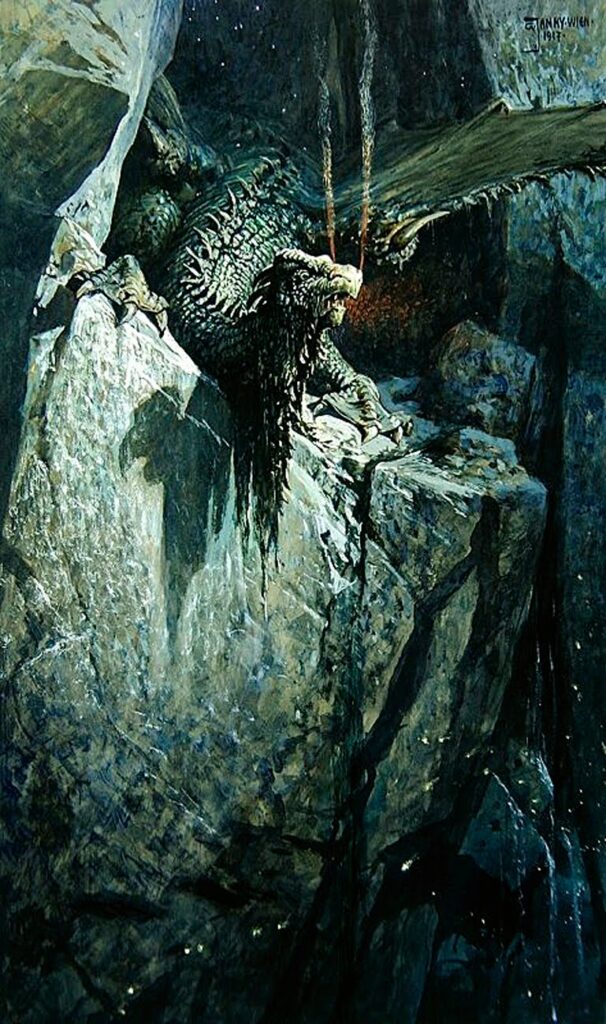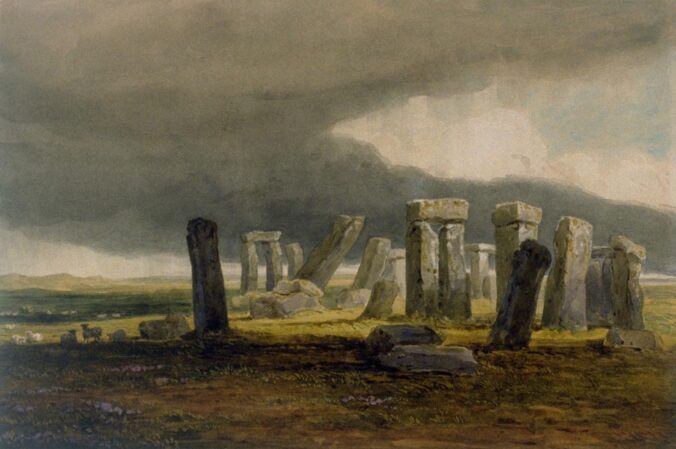Starting with Dungeons & Dragons 4th Edition, the game designers included a list of “core assumptions” in the Dungeon Master’s Guide. The core assumptions are statements that describe (most) official D&D campaign settings at a high level. (The assumptions differ somewhat between 4th and 5th edition, and it might be interesting to look at those differences one day.)
Most D&D worlds predate formal “core assumptions”. I do like the idea of using Core Assumptions at the outset of building a new world. They are our high level design decisions that inform everything else. The post “My Approach to Building a Better Enderra” outlines “how” I am going to build Enderra, the Core Assumptions outline “what” Enderra is like.
Humans (and Elves) Dominate The World
Humans, Elves, Dwarves, and Orcs are the primary civilized peoples of Enderra. Of these, humans are the most active empire-builders, the ones most likely to explore strange new lands, and the most expansionist. This invariably puts them at odds with the other races, but also with each other.
Elves have lived in organized kingdoms far longer than humans, and the nations of both races compete for much the same lands. Both sides enjoyed their successes and setbacks, but over the centuries, the elves have slowly lost land and power.
Dwarves generally tend to keep to themselves, and isolate in their mountain-homes. And while orcs are aggressive and expansionists, they are far too unorganized to build empires. They can’t even hold on to land they occupy for very long.
Humans, elves, orcs, and dwarves are all related, and they can have children with each other.
There are a few other sentient species, mostly of the monstrous kind. For example, lizardmen are the remnants of a civilization that was destroyed in a great flood a long time ago.
The Gods Are Absent
In ancient times, the gods of Enderra interacted freely with the mortal races. They guided and protected their followers, and cursed those who blasphemed. They ruled from the fabled Golden City, bringing Enderra’s greatest heroes to live with them. Some gods took mortal husbands or wives.
But that was the distant past. The gods have long since fallen silent and departed Enderra. They do not answer prayers, and they do not communicate with their followers. Some divine spells still function, and some don’t. There has been a fierce debate over what this means, but so far, nobody has found a satisfying answer.
Left to their own devices, some people have renounced their gods. Some clerics have become more radicalized, seeing the absence of their gods as a test that must be passed. Many splinter groups rose. Some resorted to violence to fight their rivals.
Commoners generally still attend the temples, and pray to the gods, as if nothing changed.
The World is Full of Conflict
Much like Earth, Enderra has been embroiled in near-constant conflict throughout its history. This does not mean that all regions have experienced open warfare at all times, but long periods of peace have been the exception, rather than the rule.
There are five main sources of conflict:
- Humans and Elves have been competing for territory for as long as anybody can remember, and Elves have very long memories.
- The largest Human Empire has fallen, destroyed in what is now only known as the “War of the Wizards”. Successor kingdoms of various sizes squabble over the scraps.
- Orcs are a constant threat. They indiscriminately raid and kill everybody, and are, in effect, in a low-intensity war with all the civilized peoples.
- Without any guidance from their gods, what was once a more or less unified religion has splintered into a myriad of groups, many of which are fighting one-another over both theological grievances, and power and influence.
- Wizards and other users of magic are often mistrusted, and in some places persecuted. The Inquisition hunts all unsanctioned practitioners of magic.
The Dwarves stay out of most wars. They are happy to sell their weapons and armor to whoever pays their prices. As a consequence, nobody really likes dwarves, but everybody nods and smiles and is happy to do business with them – when they have to.
The World is Ancient
The Human Empire was not the first to fall, nor will it be the last. Kingdoms, empires, even entire civilizations rise, prosper, and decline. From the age of darkness that follows, new kingdoms arise, repeating the cycle.
When an empire falls, most of its achievements and treasures are lost as well, often surviving only in legends and myths. Adventurers look for tangible remains, from old tomes, gold, to magical artifacts.
Enderra is not in a Medieval Stasis
Science and technology – and magic – do march on. Firearms were invented more than a century ago, to counter wizards. They are mainly used by Dwarves and Humans. Cannons are used as siege weapons, but also in naval warfare.
In general, Enderra is at a stage somewhat comparable to that of the Age of Sail, the colonial era, even the early modern age (roughly equivalent to the 1400s to 1600s). Some areas are more advanced, while some use only copper, or even stone age, technology.
Magic and technology do mix. Improvements in one do not mean the offer declines. Some wizards have created enchanted firearms, for example. There has been no scientific revolution on Enderra yet, but when that happens, Thaumaturgy will become one scientific discipline among many.
In short, the medieval stasis that many other fantasy worlds find themselves locked in, does not exist on Enderra.
Much of the World is Unexplored

While somewhat reliable maps exist for most of the “known world”, they are often inaccurate, outdated, and lacking local detail. Some kingdoms – especially human ones – have sent expeditions to the far reaches of Enderra, usually in search of trade, resources, or new magic, but also – rarely – out of sheer curiosity. But with the fall of the Human Empire, and new wars brewing, most nations have better things to do than explore the world.
The average inhabitant of Enderra knows their own town or village and its immediate surroundings. They may have traveled to nearby villages or the local market town. Few have travelled further afield, unless they fought in one of the many wars, or work as a merchant or similar. They barely know what exists beyond the next village, let alone the hills beyond that, or the interior of the dark, foreboding forest nearby.
The wilderness, even in so-called “civilized kingdoms”, can be extremely unsafe. Dangers include wild animals, monsters, even bandits or Orc raiding parties.
Magic is Uncommon
Magic-users are rare, but common enough that most folks will experience magic at one point or another. Depending on local customs and culture, magic may be seen as something mundane, or it might be revered or feared. In some locations, wizards organize, for example in guilds. Where they are not persecuted, they can wield considerable political power.
There are not “magic shops” where an adventurer can just buy a magical sword, but potions are fairly accessible. As for everything that is incredibly valuable, there is a black market, and finding the right artifact can make an adventurer incredibly rich.
Magic used to be a lot more common, which is why adventurers – who explore ancient ruins – often have more access to magic than other people. It is also more common in some distant lands.
Fantastic locations do exist, but they are likewise rare. There may well be a city inside an active volcano, or an enchanted forest from which there is no escape, a gate between worlds, or a castle in the clouds, but they do not litter the landscape.
There are other worlds – other planes of existence. Many spells interact with extraplanar creatures, or permit travel to – or through – other planes. Some adventurers explore these worlds, but doing so is extremely dangerous.
Last but not least, I’ve always been a fan of Spelljammer – as a serious setting; not the joke into which TSR turned it – so Enderra does exist in a Spelljammer universe. Contact between spelljammer civilizations and Enderran groundlings is essentially nonexistent. That said, at least one nation on Enderra has magical, flying ships. They might be able to reach the stars. We’ll find out.
The Adventurers and their Foes are Exceptional
While there are other powerful people on Enderra, there are few who rise in power as quickly, and as far, as player characters. Powerful people tend to attract other powerful people, either as allies or as opponents.
While many characters may have some levels in a player character class, not every king is a high level fighter, not every guild master is a high level rogue.
Player characters are above-average capable and talented, and they tend to be at the right place at the right time to have a chance to shape the history of Enderra.
Many Shades of Grey
The traditional alignment system of Dungeons & Dragons applies only loosely to Enderra. Even people who adhere to a strict moral code (like some Paladins) have flaws and may act differently according to situation. And nobody thinks of themselves as “evil”. People may act in a way we consider evil, but they usually do so for a reason other than pure spite or sadism.
I think that sums it up. These assumptions may change over time; world design is very iterative, and I may expand the list, or edit it, at a later date.

